Why an Open Line of Communication Between Industry and CBP is Critical and How a Lack of Proper Training in the Handling of Goods Negatively Impacts Everyone Except the Counterfeiters

By Anne-Liese Heinichen, ERAI
U.S. Customs and Border Protection (CBP) is undoubtedly faced with a gargantuan task. A 2015 fiscal year summary by Homeland Security reports that each year over 11 million maritime containers, 10 million truck containers, 3 million rail containers and a quarter billion additional cargo, postal and express packages arrive through air travel in the US .
i From these shipments, the number of IPR seizures increased nearly 25% to total 28,865 in 2015 resulting in 538 arrests with 339 indictments and 357 convictions.
ii Regrettably, these seizures represent only a drop in the bucket against limiting counterfeiting activities both domestically and globally. Unfortunately, this also means that most counterfeits are seeping through.
While CBP has demonstrated an effort to improve their interaction with the industry, more changes need to be enacted. ERAI has received complaints with regards to improper handling and repackaging, trouble in obtaining samples of parts that are detained, difficulty in locating and contacting an appropriate CBP representative, delays in receipt of authentic goods and even receiving suspect counterfeit parts from a shipment that underwent a CBP inspection.
In our effort to raise awareness and provide feedback from the industry, during the first quarter of 2016, ERAI began collecting data from companies who have sent or received shipments that have been inspected by CBP and are subsequently received in a damaged condition due to mishandling and/or incorrect repackaging.
Highlighted below are three reports submitted to ERAI outlining inefficiencies with CBP’s inspection processes.
Report 1:
An authorized aftermarket manufacturer shipped eight (8) pieces of custom-manufactured programmable logic ICs to a customer located in the United States. The shipment contained a certificate of conformance. The parts cost $1,000.00 per piece.
The customer received the shipment, which had been inspected by CBP; the box and ESD bag had been opened with a sharp blade across the middle of the packaging. It appears that the trays were removed from the box and the ESD tape binding the layers was cut. Please note: the images have been modified to remove any identifying marks.
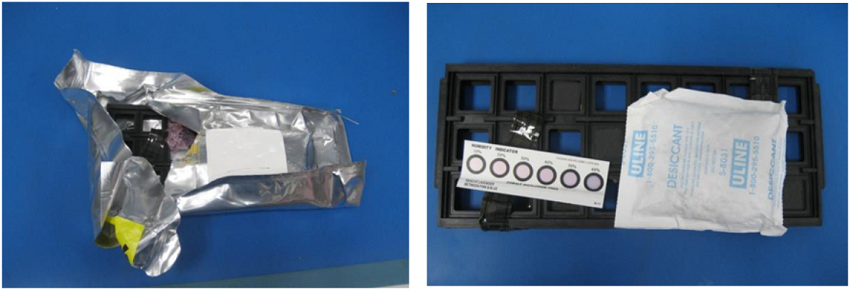
The tray may have been upside down, possibly causing the devices to fall out, resulting in damage to four (4) of the parts. Please note: the images have been modified to remove any identifying marks.
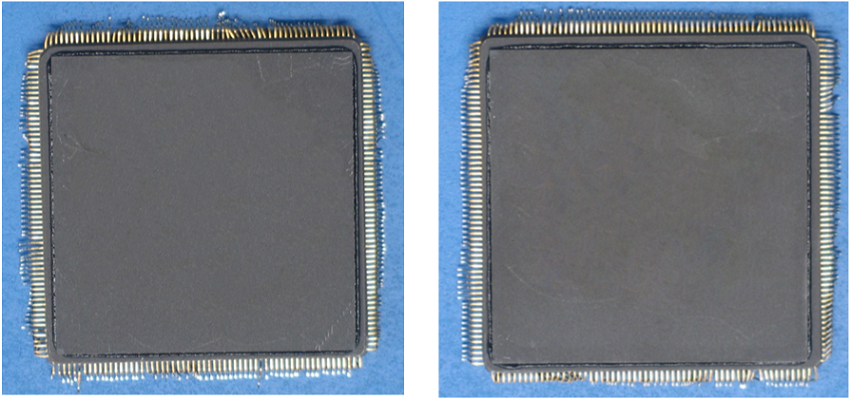
The customer noted the trays had not been resealed with tape and the shipment contained only seven (7) devices (one device was missing). Aside from sustaining a loss of $5,000.00 ($4,000.00 for 4 damaged parts plus $1,000.00 for a missing part), the aftermarket manufacturer states that very few of the devices remain as they stock what is likely the last good die required to continue to build these devices and state that, “even the loss of 8 pcs hurts”.
Report 2:
A U.S.-based organization procured 300 pieces of Freescale part number DSP56303AG100 from an international supplier. Prior to importing the goods into the United States, the parts were sent to a third party test house. The test house reported the receipt of 300 pieces properly packaged in trays with ESD protection and desiccant.
The 100 pieces were visually inspected according to SAE AS6081 and MIL-STD-883, Method 2009.9 and no anomalies were found; the report observed that “devices are in new condition”. One hundred samples underwent curve tracer electrical testing to MIL-STD-883 and manufacturer’s specifications and all 100 pieces passed. After inspection and testing were completed, the parts were packaged with a copy of the test report and shipped to the U.S.
Upon receipt, the organization noted the parts were improperly repacked in the trays with green CBP tape.
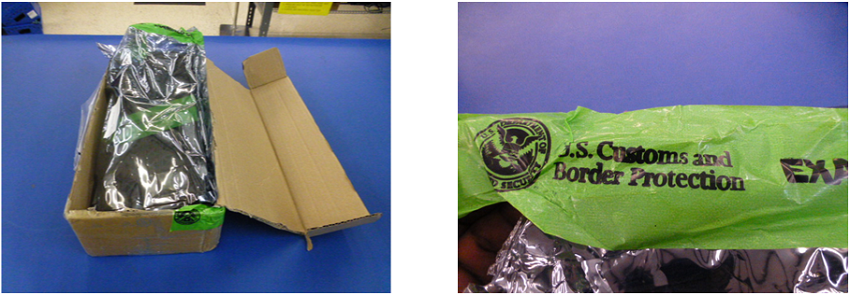
The devices that had been inspected by CBP were placed back into the trays upside down and/or incorrectly oriented resulting in damages to the leads on six (6) pieces and a loss of $98.98 to the organization.
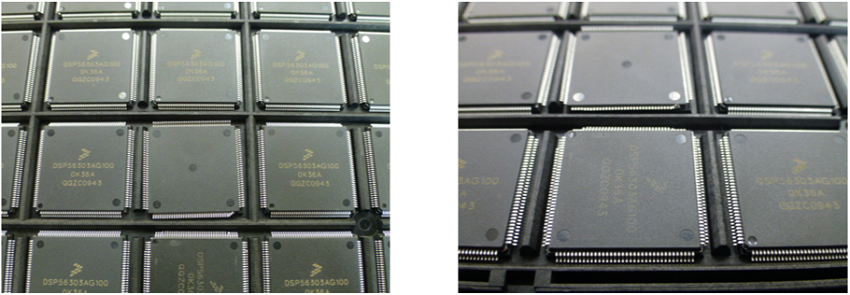
Despite CBP’s recommendation that shipments contain as much documentation and traceability documents as possible, this organization still sustained a financial loss.
Report 3:
Another U.S.-based company sourced 200 pieces of Agilent HDMP-1024G from an overseas supplier. En route to the U.S., the parts were detained by U.S. Customs for 30 days. The vacuum-sealed bags appear to have been cut open with a box cutter, two of the bands securing the trays were cut and two pieces of the part in question were removed for inspection.
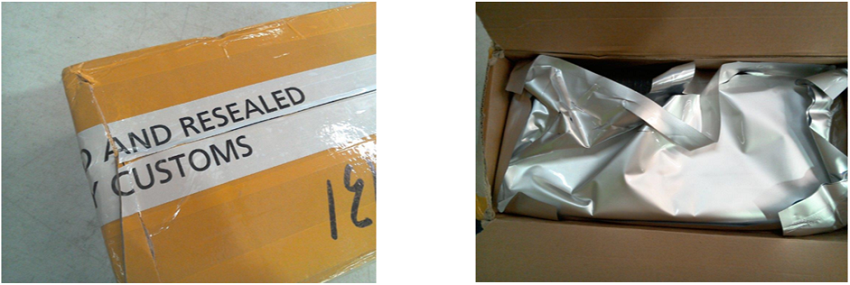
The goods were released from Customs and were delivered to the company. When the shipping box was opened, the parts fell out. The entire lot was significantly damaged due to improper repackaging.
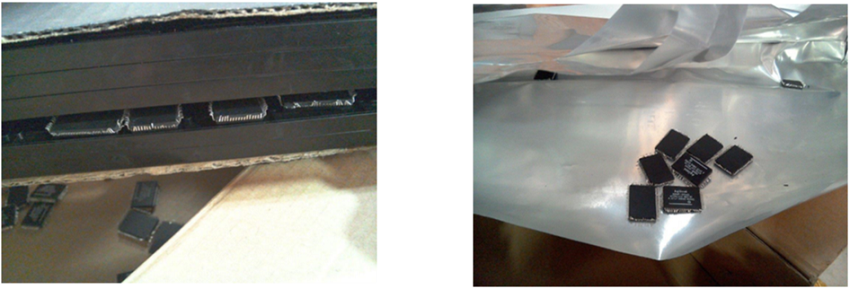
Despite the damaged condition of the goods, the U.S. distributor began its standard counterfeit screening process and immediately determined the parts had been altered from their original condition and failed their inspection.
Documentation, Packaging & Shipping Inspection Revealed:
- Mishandled/damaged packaging materials
- Trays are warped, cracked, bent or damaged
- Tears and/or puncture holes in bag
Lead External Visual Inspection Revealed:
- Evidence of prior use present
- Missing, bent, trimmed, cracked and/or non-planar leads
- Damaged leads, threads, etc.
Mechanical Scraping (e.g. Scrape Test, Scratch Test) Revealed:
- Evidence of tampering present
- Secondary coating/blacktopping lifted during test
- Previous part markings (e.g. ghost markings) visible after test
- Difference in surface texture visible after test
The entire lot was marked with a single date code, 0737, but during a mechanical scrape test, resurfacing material was removed revealing numerous date codes including, but possibly not limited to, 0523, 0526, 0551 and 0610.


It is unclear how these goods were released by CBP. The U.S. distributor has quarantined the parts to prevent their reentry into the supply chain.
Summary:
Although CBP’s efforts are commendable, additional work is needed to properly train staff in the detection of counterfeit parts and correct handling of authentic integrated circuits. Companies that supply authentic goods are sustaining financial losses for damage caused by CBP, in some cases, despite following CBP’s recommendations to include testing and traceability documentation in shipments. U.S.-based organizations are facing long (in some cases extended) delays in receiving good parts and are subsequently unable to fill orders in their entirety or are unable to meet their customer’s specified delivery dates. Some of the authentic material being damaged is virtually irreplaceable, opening an opportunity for counterfeit goods to make their way into the supply chain. Worse yet, the last example illustrates that suspect counterfeit material, despite being inspected by CBP, is still being released.
Steps you can take:
1. File a claim with CBP
CBP provides Standard Form 95, Claim for Damage, Injury or Death, for individuals to file claims for property damage or loss. The form should be submitted to the CBP port of entry or Border Patrol station nearest to the location where the incident occurred. CBP does advise that the review process may “take several months”. More details, the form and address submission information can be found at:
https://help.cbp.gov/app/answers/detail/a_id/178/~/tort-claims---claim-for-property-damage-or-loss,-or-personal-injury,-or-death
Organizations who file a claim and receive a decision from CBP are requested to contact ERAI and let us know the outcome of the claim.
2. Report customs damage to ERAI
ERAI has begun documenting these types of incidents in an effort to demonstrate to Customs the importance of proper handling and repacking. Our objective is to raise awareness and provide feedback from the industry that might lead to changes in how shipments containing sensitive devices are inspected and repackaged.
Your input is vital. If you receive a damaged shipment that is the result of improper handing or repacking by CBP, please take a moment to let us know. To access the form simply click on the "Report" tab in the web-site's top navigation bar and select "Report CBP Damage" or visit
http://www.erai.com/Report_CBP_Damage_. You do not need to be a member of ERAI to submit a report. Your identity will remain confidential and will not be revealed to CBP.
3. Obtain insurance for your shipments
Ocean cargo insurance policies can provide coverage for damage to goods as the result of actions by CBP dur-ing the course of an inspection. Items not covered generally include seizures by CBP and coverages for delays as a result of a detention. For more information, please contact Howard Miller at LBW Insurance and Financial Services at
HowardM@lbwinsurance.com.
i U.S. Department of Homeland Security. (2015), Intellectual Property Rights Seizure Statistics Fiscal Year 2015.
https://www.cbp.gov/sites/default/files/assets/documents/2016-Apr/FY%202015%20IPR%20Stats%20Presentation.pdf
ii U.S. Department of Homeland Security. (2015), Intellectual Property Rights Seizure Statistics Fiscal Year 2015.
https://www.cbp.gov/sites/default/files/assets/documents/2016-Apr/FY%202015%20IPR%20Stats%20Presentation.pdf
A U.S.-based distributor placed an order with an international supplier for goods that were subsequently inspected by U.S. Customs and Border Protection (CBP). Because the goods were not properly repackaged, the parts were severely damaged in transit causing a financial loss to the importer. CBP bears no financial responsibility or liability even if their negligence contributed to the damage of the goods.
ERAI has begun documenting these types of incidents in an effort to demonstrate to Customs the importance of proper handling and repacking. Our objective is to raise awareness and provide feedback from the industry that might lead to changes in how shipments containing sensitive devices are inspected and repackaged. Your input is vital. If you receive a damaged shipment that is the result of improper handing or repacking by CBP, please submit a report to ERAI at
http://www.erai.com/customuploads/ERAI_CBP_Damage_Report.docx